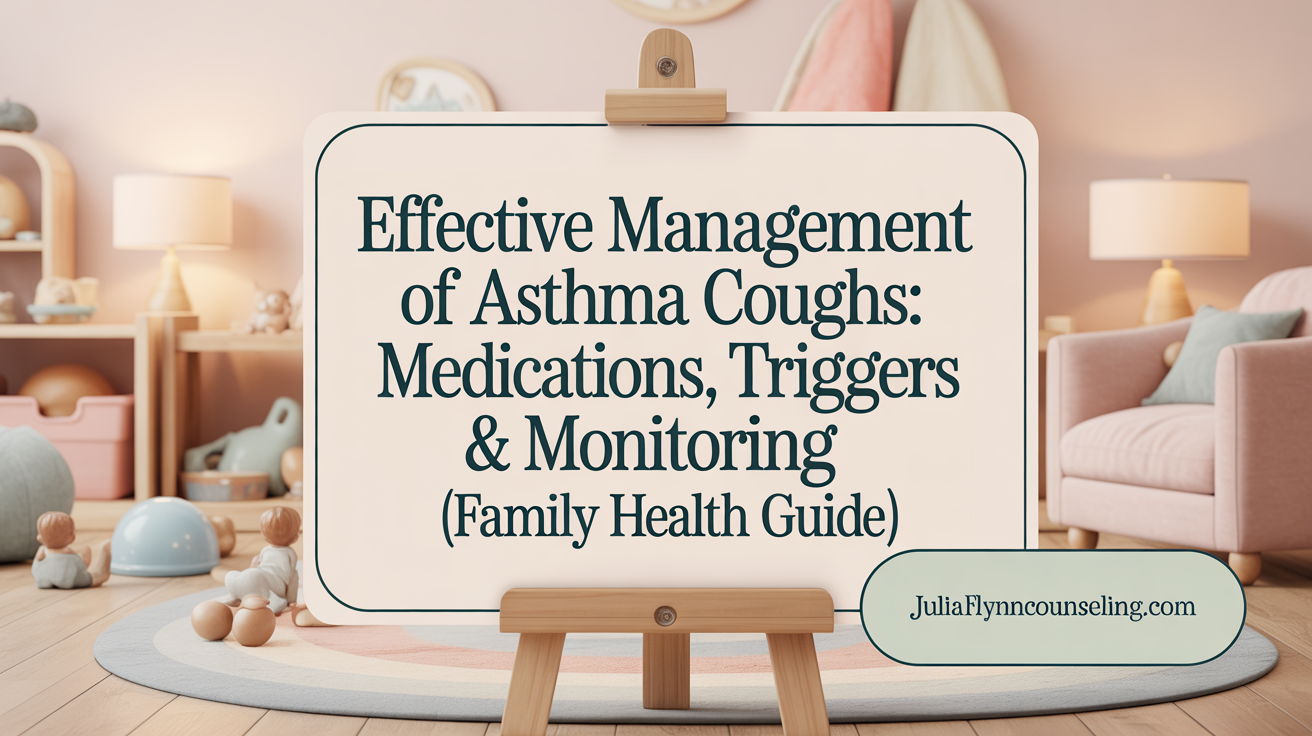The Complexity Behind a Common Symptom
A cough is one of the most frequent reasons people seek medical care, yet deciphering whether it signals a simple ailment or a chronic condition like asthma can be challenging. This article explores how to distinguish asthma-related coughs from those caused by viral infections, allergies, or other respiratory issues, aiding readers in recognizing symptoms, identifying triggers, and understanding treatment options.
Identifying the Asthma Cough: Characteristics and Symptoms

What type of cough is common in asthma?
Asthma-related coughs are typically dry and non-productive, meaning they do not bring up mucus. This persistent, hacking cough often worsens at night or after physical activity. The cough results from airway inflammation and tightening of the bronchial tubes, which triggers a reflex to clear irritants from the airways. It is usually a chronic symptom that endures for weeks or recurs frequently.
What symptoms usually accompany an asthma cough?
Along with coughing, individuals with asthma often experience wheezing—a high-pitched whistling sound during exhalation—chest tightness, and shortness of breath. These symptoms tend to happen during exertion, at night, or in response to triggers such as cold air, dust, or pollen. The cough may be the only sign in some cases, especially in cough-variant asthma, but it commonly occurs alongside other respiratory symptoms.
How does the pattern of asthma cough change, including at night?
Asthma coughs frequently worsen at night, which can be due to increased mucus secretion, exposure to cold or dry air, and natural fluctuations in inflammatory response. During sleep, the body's reduced ability to control inflammation allows symptoms like coughing and wheezing to become more pronounced. Such nocturnal symptoms are important indicators of asthma, prompting individuals to monitor their pattern and intensity.
What is the difference between dry and productive coughs in asthma?
The classic asthma cough is dry, meaning it does not produce mucus or phlegm. It is caused by airway inflammation and constriction rather than infection or mucus buildup. While a dry cough is typical, some people with asthma may develop a productive cough that expels mucus, especially during exacerbations or if they have co-existing conditions like sinusitis. However, the hallmark of asthma cough remains its dryness and irritation.
What signs beyond a normal cough suggest asthma?
Persistent coughing that lasts longer than three weeks, worsens at night, and occurs alongside wheezing, chest tightness, or shortness of breath points to asthma. If coughs are triggered by allergens, cold air, or exercise, or if symptoms improve after using inhalers or corticosteroids, this supports an asthma diagnosis. Notably, a dry, chronic cough with associated breathing difficulties that does not resolve with common cold remedies should be evaluated by a healthcare provider to confirm asthma and initiate appropriate treatment.
Understanding Cough-Variant Asthma: A Subtle Presentation

What are the symptoms of cough-variant asthma and how does its cough differ from typical asthma?
Cough-variant asthma (CVA) mainly shows up as a lasting dry, hacking cough that can go on for weeks. Unlike classic asthma, it usually does not include obvious symptoms like wheezing, chest tightness, or shortness of breath at first. The cough is often the only sign, triggered by environmental factors such as cold air, allergens, or irritants.
Because the cough in CVA is dry and non-productive, it might be mistaken for other common causes of cough, like a cold or allergies. Over time, some people with CVA may develop additional asthma symptoms, but initially, the main feature is this persistent dry cough.
Both CVA and typical asthma involve airway inflammation but CVA tends to lack the wheezing and breathing difficulties that are typical of classic asthma. The diagnosis can be challenging because the cough mimics other respiratory issues, but it responds well to asthma medications like inhaled corticosteroids, leukotriene receptor antagonists, and rescue inhalers.
In summary, CVA differs from typical asthma primarily by its presentation, focusing solely on a dry cough without prominent breathing problems. Recognizing this pattern is crucial for early treatment and preventing progression to more severe asthma symptoms.
Triggers and Causes of Asthma-Related Coughs

What are common triggers and causes of asthma-related coughs?
Asthma-related coughs can be triggered by a variety of environmental, respiratory, and personal factors. Common culprits include outdoor allergens like pollen from trees, grasses, and weeds, which can irritate sensitive airways. Indoor allergens such as dust mites, pet dander, and mold also play significant roles in provoking coughs.
Environmental irritants like cigarette smoke, air pollution, chemical fumes, and strong household odors can inflame the airways, intensifying coughing episodes. Respiratory infections, including colds and the flu, often exacerbate asthma symptoms, leading to persistent coughs. Physical exertion, especially in cold or dry air, can trigger bronchospasm, resulting in dry, wheezing coughs.
Weather conditions and humidity levels influence airway responsiveness; humid or very hot weather can worsen breathing issues, while sudden weather changes can act as triggers. Exposure to occupational dust, fumes, or chemicals may also irritate the respiratory tract, increasing cough frequency.
In addition, emotional stress and intense physical activity can provoke airway constriction, causing coughing. Some medications, particularly aspirin and NSAIDs, are known to trigger asthma symptoms in sensitive individuals. Hormonal fluctuations and other underlying health conditions might also contribute to increased coughing in asthma.
Understanding these triggers helps in managing asthma effectively. Avoiding identified irritants, monitoring air quality, and taking prescribed medications can reduce the frequency and severity of coughs, ultimately improving quality of life for those with asthma.
Differentiating Asthma from Other Respiratory Conditions

How can asthma be differentiated from other respiratory conditions such as common coughs or COVID-19?
Identifying whether a cough is caused by asthma or another respiratory illness involves examining the pattern and associated symptoms. Asthma often presents with recurrent episodes of dry coughing, wheezing, chest tightness, and shortness of breath, especially triggered by physical activity, cold air, allergens, or respiratory infections.
In contrast, common coughs caused by viruses like colds, the flu, or COVID-19 are typically acute, often accompanied by systemic symptoms such as fever, muscle aches, sore throat, and fatigue. COVID-19 may also include loss of taste or smell, which are less characteristic of asthma.
Diagnostic tools are vital. Spirometry, a lung function test, measures airway response. In asthma, spirometry usually shows reversible airway obstruction, with improvement after using bronchodilators. COPD, a related but distinct condition, displays a fixed airflow limitation.
For cough-variant asthma, the primary symptom might be a persistent dry cough without wheezing or other classic signs. These cases respond well to inhaled corticosteroids.
Conditions like gastroesophageal reflux or post-nasal drip, common causes of chronic cough, are identified through medical history, physical exam, and specific tests like allergy assessment or upper GI evaluations.
Infections such as pneumonia or bronchitis often cause productive coughs with mucus, fever, and systemic illness symptoms, differing markedly from the airway-sensitive cough of asthma.
Therefore, a thorough clinical assessment, including review of symptom patterns and diagnostic testing, is essential for accurate diagnosis and appropriate treatment.
When to Seek Medical Advice for Persistent or Concerning Coughs

Signs and Symptoms Warranting Medical Evaluation
Persistent and recurrent coughs, especially those lasting longer than three weeks, should prompt a visit to a healthcare provider. Symptoms such as wheezing, shortness of breath, chest tightness, or coughing up blood indicate potential asthma or other lung issues that require assessment.
Accompanying symptoms like fever, night sweats, unexplained weight loss, or leg swelling may suggest infections, allergies, or more serious conditions like lung cancer or heart failure. Noticing discolored mucus—green or yellow—and worsening cough patterns also warrant professional evaluation.
Urgent Conditions Linked with Cough
In urgent cases, symptoms such as difficulty breathing, persistent wheezing, cyanosis (bluish lips and fingers), fainting, or severe chest pain require immediate medical attention. These signs can indicate life-threatening conditions like severe asthma attacks, pneumonia, or pulmonary embolism.
Coughing that involves choking, vomiting, or if the individual is unresponsive often suggests an airway obstruction or a critical health event needing emergency intervention.
Cough Duration and Nature Implications
A cough lasting more than three weeks is classified as a chronic cough and often indicates underlying issues like asthma, post-nasal drip, or even infection complications. A sudden change in cough severity or the development of associated symptoms should also involve medical review.
Dry, persistent coughs are common in asthma and allergies, whereas wet coughs with mucus may point to infections like bronchitis or pneumonia. Recognizing these patterns helps determine urgency and the appropriate care.
Risks of Ignoring Persistent Cough
Ignoring a long-term cough can lead to worsening of underlying conditions, increased risk of lung damage, or delayed diagnosis of serious diseases, including cancer. It can also result in reduced quality of life due to sleep disturbances and daily discomfort.
Prompt evaluation and management prevent complications, help control symptoms, and provide reassurance.
Importance of Specialist Consultation
When initial treatments do not alleviate a cough, or if symptoms are atypical, consulting specialists such as pulmonologists or allergists is essential. These experts can conduct detailed testing, including spirometry, allergy assessments, or imaging, to diagnose conditions like asthma, COPD, or other lung diseases.
Early and accurate diagnosis allows for tailored treatment plans, improving respiratory health and reducing long-term risks.
Treatment and Management Strategies for Asthma-Related Cough

What treatment options and management strategies are available for asthma-related cough?
Managing a cough caused by asthma involves targeted treatments that control airway inflammation and minimize flare-ups. Regular use of controller medications such as inhaled corticosteroids, leukotriene modifiers, immunomodulators, and combination inhalers helps reduce swelling and responsiveness of the airway tissues.
In addition to long-term control medications, quick-relief inhalers like short-acting beta-agonists provide immediate relief during coughing episodes and asthma attacks. These are essential for managing sudden symptoms and preventing worsening of the cough.
Avoidance of triggers plays a crucial role. This includes minimizing exposure to dust, pollen, smoke, pet dander, and pollutants. Creating an asthma action plan, which guides medication use and helps recognize signs of worsening symptoms, significantly improves management.
Proper use of inhalers and adherence to prescribed therapies are critical for effectiveness. For severe or resistant cases, procedures such as bronchial thermoplasty may be considered. Continuous monitoring through peak flow meters and regular medical reviews ensure optimal control and reduce cough frequency.
Why do asthma coughs often occur at night and how can they be controlled?
Nighttime asthma coughs often worsen due to increased airway inflammation overnight and biological changes during sleep. When lying flat, mucus can accumulate and trigger coughing or wheezing. Exposure to indoor allergens like dust mites in bedding, pet dander, or irritants like cold air can also inflame the airways further.
Hormonal fluctuations and normal circadian patterns contribute to increased airway constriction during the night. To manage nocturnal coughs, patients should stick to their medication schedules, especially inhaled corticosteroids and bronchodilators.
Creating a suitable sleep environment reduces triggers: maintaining a clean, allergen-free bedroom, using dust-mite-proof bedding covers, and controlling humidity with a dehumidifier help. Elevating the head of the bed can facilitate easier breathing. Sleeping on the left side may reduce airway constriction.
Additional measures include using humidifiers to keep the air moist, which soothes dry airways, and consulting healthcare providers to tailor an asthma action plan for nighttime symptoms. Addressing related issues like reflux or sleep apnea further decreases the risk of nighttime coughing.
| Treatment Strategies | Specific Actions | Benefits |
|---|---|---|
| Long-term control medications | Inhaled corticosteroids, leukotriene modifiers | Reduce inflammation and prevent symptoms |
| Quick-relief inhalers | Short-acting beta-agonists | Immediate symptom relief during attacks |
| Environmental control | Allergen-proof bedding, air purifiers | Decrease exposure to triggers |
| Sleep positioning | Elevate head, sleep on left side | Minimize airway constriction |
| Regular monitoring | Use peak flow meters, routine checkups | Detect early signs of worsening |
Ongoing partnership with healthcare professionals, routine follow-ups, and adherence to tailored management plans are essential to reducing asthma cough episodes and improving quality of life.
Taking Control: From Symptom Awareness to Effective Management
Distinguishing between asthma and simple coughs is crucial for timely diagnosis and appropriate management, especially as asthma can silently worsen if left untreated. Recognizing the characteristic features of asthma-related coughs, understanding cough-variant asthma, and knowing when to consult healthcare professionals are key steps in safeguarding respiratory health. Through proper diagnosis, avoidance of triggers, and adherence to tailored treatment plans, individuals with asthma can enjoy improved quality of life and prevent severe complications. Staying informed and proactive about respiratory symptoms empowers patients and caregivers to manage asthma effectively and reduce the burden of chronic coughing.
References
- Cough Vs Childhood Asthma | Health Library
- Do you have an asthma cough?
- Is It Just a Cough or Asthma? Know the Difference
- Asthma Cough | Causes, Symptoms & Treatment | ACAAI Public ...
- Types of Coughs in Kids | Children's Hospital Colorado
- Is It Just a Cough – Or Childhood Asthma? - University Hospitals
- Asthma - Symptoms and causes - Mayo Clinic
- Asthma Cough: Diagnosis and Treatment Options - NowServing
